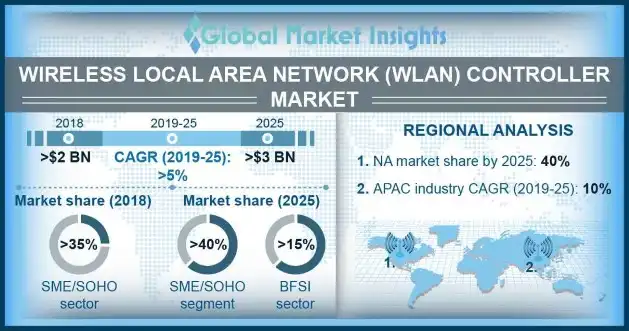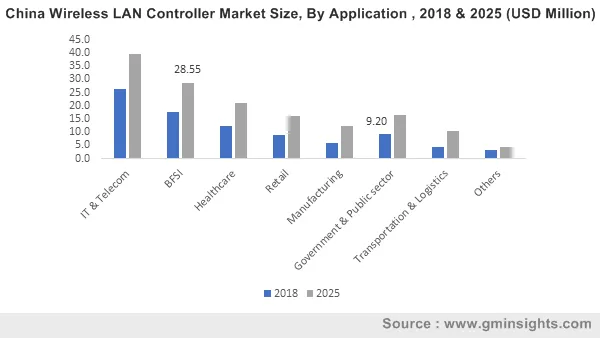Summary
Table of Content

Wireless LAN Controller Market
Get a free sample of this report
Form submitted successfully!
Error submitting form. Please try again.
Thank you!
Your inquiry has been received. Our team will reach out to you with the required details via email. To ensure that you don't miss their response, kindly remember to check your spam folder as well!

Request Sectional Data
Thank you!
Your inquiry has been received. Our team will reach out to you with the required details via email. To ensure that you don't miss their response, kindly remember to check your spam folder as well!
Form submitted successfully!
Error submitting form. Please try again.
Wireless LAN Controller Market Size
Wireless LAN Controller Market size in 2018 exceeded USD 2 billion and is estimated to grow at a CAGR of over 5% from 2019 to 2025.
 To get key market trends
To get key market trends
The wireless LAN controller market will exhibit a significant growth rate from 2019 to 2025 as businesses are continuously expanding their wireless infrastructure to support enterprise mobility. This will compel them to adapt to centralized wireless LAN controllers that can monitor the entire LAN infrastructure, reducing the overall network management costs. To support the continuously changing & unpredictable business requirements, such as high-bandwidth and low latency, and to support business-critical applications, enterprises are relying heavily on their wireless network infrastructure. Traditional Wi-Fi architectures are unable to meet these requirements, increasing the implementation of cloud-managed wireless networks. The rising demand for Wi-Fi access within the enterprises has made it challenging for network administrators to manage thousands of Access Points (APs). This has resulted in the adoption of cloud-managed wireless LAN controllers, where APs are connected to a virtual controller located in the public cloud. Cloud service providers manage controllers and enable organizations to support a wide range of APs without incurring any additional costs to purchase the wireless LAN management equipment.
Wireless LAN Controller Market Report Attributes
| Key Takeaway | Details |
|---|---|
| Market Size & Growth | |
| Base Year | 2018 |
| Market Size in 2018 | 2 Billion (USD) |
| Forecast Period 2019 - 2025 CAGR | 5% |
| Market Size in 2025 | 3 Billion (USD) |
| Key Market Trends | |
| Growth Drivers |
|
| Pitfalls & Challenges |
|
What are the growth opportunities in this market?
Wireless LAN Controller Market Analysis
 Learn more about the key segments shaping this market
Learn more about the key segments shaping this market
The integrated wireless LAN controller segment will hold a market share of over 40% by 2025 due to the growing need to deploy a controller with integrated security functionalities. wireless LAN controllers enable enterprises to manage, control, optimize, and secure their network resources from a single device. Enterprises are widely using such controllers to reduce their hardware procurement and maintenance costs. Several companies operating in the wireless LAN controller market are introducing smart controllers, which can manage multiple access points & switches and also comply with the latest Wi-Fi standards.
SME/SOHO held a wireless LAN controller market share of over 35% in 2018 and are expected to hold a share of over 40% in 2025. To support business-critical networking needs, enterprises need network management solutions, which can monitor their LAN devices and secure their networks. SME are embracing wireless access for their networks to reduce network management costs and improve employee productivity. As the number of small organizations and branch offices using wireless infrastructure continues to surge, the demand for wireless LAN controllers to provide wide area coverage and centralized management will increase. They will rapidly use such controllers to handle network challenges related to management and security and support their growing number of APs in a cost-effective manner.
 Learn more about the key segments shaping this market
Learn more about the key segments shaping this market
The BFSI wireless LAN controller market is estimated to hold a share of over 15% in 2025. The growing trend of workforce mobility and the adoption of digital platforms are becoming enablers for the BFSI industry to reduce operational costs and deliver exceptional services to customers. However, this has also resulted in an increase in the use of smartphones and networking devices such as access points, switches, routers, and firewalls. To unburden IT teams from managing the complex network of devices, banking & financial institutions are leveraging on wireless LAN controllers, which offer high-performance through optimization of network connections.
The Asia Pacific wireless LAN controller market will witness the fastest growth rate of around 10% over the forecast timespan due to the rise in the usage of smartphones and laptops by residential & business customers. The growing trend of BYOD and the huge demand for bandwidth-intensive applications to meet business needs have resulted in an increase in the deployment of access points to support connectivity demands. To manage multiple access points across a network in a cost-effective way, enterprises are deploying cloud-managed wireless LANs. In February 2017, D-Link Corp, partnered with TeamF1, a subsidiary of D-Link India Ltd., for delivering mydlink Business, a cloud-based device management platform. This partnership helped enterprises to easily deploy wireless LAN for enterprise connectivity. The ongoing investments in the wireless networking technologies, such as 4G & 5G, will also spur the adoption of LAN controllers to monitor the access points and network devices in real-time to improve network efficiency.
Wireless LAN Controller Market Share
The companies present in the wireless LAN controller market are adopting strategies, such as new product development and partnerships, to gain a competitive edge over each other. Some companies are offering cloud services as well as cloud-enabled network devices including managed switches, firewalls, and routers. For instance, Meraki offers a Cloud Controller interface, which can be managed from any location using Meraki’s app. Meraki Cloud solution supports network resources provisioning, application usage policies, and traffic shaping capabilities. The technology companies are strategically collaborating with cybersecurity companies to enhance the security of their wireless LAN solutions. For instance, in May 2018, ZyXEL partnered with Bitdefender, a global security technology company, to provide a high level of security to its customers from online threats. This partnership helped the company to provide the industry-leading anti-malware services to its wireless LAN products.
Some of the major companies operating in the wireless LAN controller market are
- Belden
- Cisco
- ALE
- Allied Telesis
- Dell
- D-Link
- Fortinet
- Huawei
- Extreme Networks
- HPE
- Juniper Networks
- ZTE
- Zyxel
- Netgear
- Ruckus Networks
- TP-Link
Industry Bckground
Enterprises are globally shifting from wired networks to wireless LAN technologies to minimize costs and improve business productivity. The digitalization has enabled them to scale up their networks to accommodate a significant number of wireless devices such as smartphones and laptops, making it difficult for them to manage wireless devices. To cost-effectively monitor & manage the deployment of wireless LAN, they are using wireless LAN controllers. wireless LAN controllers reduce the overall operational expenses by centralizing & simplifying network deployment, operations, management, and monitoring of access points in the enterprise network. With the growing inclination toward cloud platforms, the demand for cloud-enabled WLAN products is expected to increase over the years as these platforms have inbuilt security functionalities, such as intrusion prevention, network monitoring & troubleshooting, and e easy management of network resources.
Frequently Asked Question(FAQ) :
What was the estimated global wireless LAN controller market size in 2018?
The market size of wireless LAN controller exceeded USD 2 billion in 2018.
Which companies are currently manufacturing wireless LAN controllers?
Companies like Cisco, Belden, Allied Telesis, ALE, D-Link, Dell, Huawei, Fortinet, HPE, Extreme Networks, and Juniper Networks are leading manufacturers in the market.
Why is the BFSI sector actively adopting wireless LAN controller devices?
BFSI sector is heavily adopting wireless LAN controllers as it unburdens IT teams from managing the intricate network of devices and provides high-performance by optimizing network connections.
How are SMEs benefitting from wireless LAN controllers?
SMEs are deploying wireless LAN controllers as it enables effective handling of network challenges related to security and management and supports the growing number of APs in a cost-effective way.
What is the anticipated growth for the wireless LAN controller industry share during the forecast period?
The industry share of wireless LAN controller is estimated to grow at a CAGR of over 5% from 2019 to 2025.
What are the growth estimates for Asia Pacific wireless LAN controller market till 2025?
The Asia Pacific market will witness growth rate of around 10% during the forecast timespan due to rise in the usage of smartphones and laptops by residential & business customers.
Wireless LAN Controller Market Scope
Related Reports


